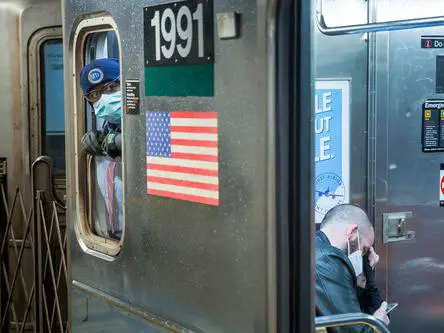Americans have long believed that wearing a mask was unnecessary unless you were actually sick. Yet over the last two weeks, donning a mask has become a common sight for those dashing into a grocery store to buy essentials and apartment concierges in frequent contact with the public.
Data compiled by Johns Hopkins University showed the death toll in the United States from the coronavirus surpassed 23,600 early Tuesday, more than those reported by any other country around the globe.
However, although Americans have generally abided by the federal government's guidelines asking them to keep social distance, avoid group gatherings and practice good hygiene, wearing masks has been harder to come by.
Not only were most Americans still reluctant to wear masks when the coronavirus ravaged across the country, they also doubted the effectiveness of doing so in preventing the transmission of the disease, believing that only sick people need to wear them.
Some were even physically attacked for covering their faces.
When the Centers for Disease Control and Prevention, which previously did not suggest that healthy people wear masks, put out a recommendation on April 3 for the use of "cloth face coverings" in light of a large number of asymptomatic bearers of coronavirus, Americans finally began to realize the merits of such practices.
As a result, more and more of them have since chosen to wear masks, scarfs or other makeshift coverings.
Zhang Siqi, a visiting scholar at Duke University, recalls the reaction of an employee at her local Costco wholesale store when seeing her talking while wearing a mask in mid-March.
"She was sanitizing the handrail of my shopping cart with disinfecting wipes," Zhang said of the employee. "When I explained to her that she didn't need to do so since I was wearing the mask, she got so nervous and scared that she suddenly jumped two meters away from me, not at all caring about what I said."
Zhang said the employee's reaction made her feel unwelcome, "as if the virus was erupting from my mouth as I spoke."
Things have changed now. When Zhang and her fellow members from the North Carolina Chinese Scholars Sino-U.S. Exchange Association went to a local police station on April 10 to donate two boxes of masks, a police officer was very grateful, saying he would encourage his colleagues to wear them.
The change in Americans' attitudes towards wearing masks is reflective of the Chinese experience in combating the virus more objectively and rationally.
Gradually abandoning previous misperceptions, Americans have come to understand that those wearing masks do not necessarily carry the virus. People do so to effectively prevent the virus from further spreading.
As the police officer told Zhang, "We'll get through this together."
(ASIA PACIFIC DAILY)
 简体中文
简体中文

